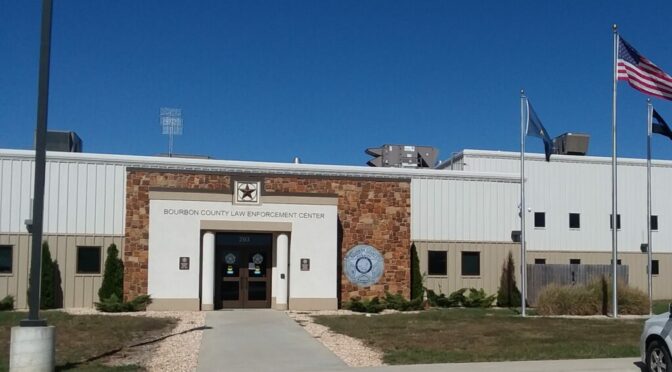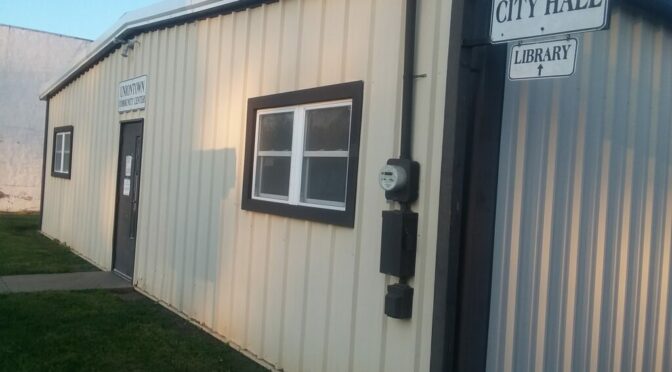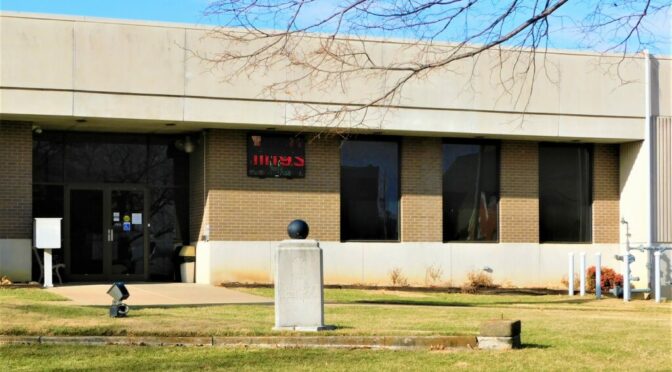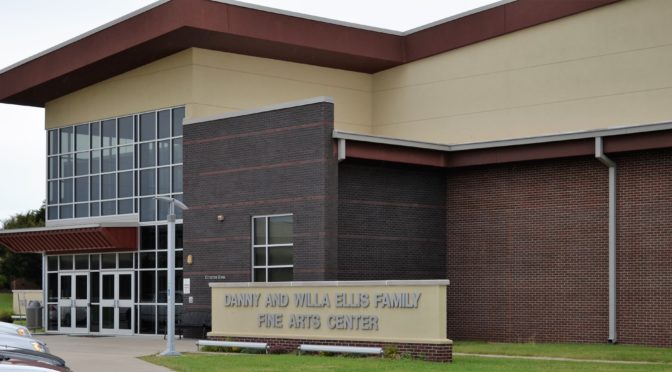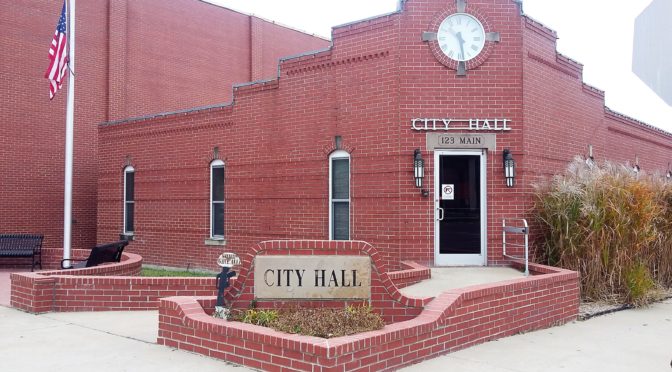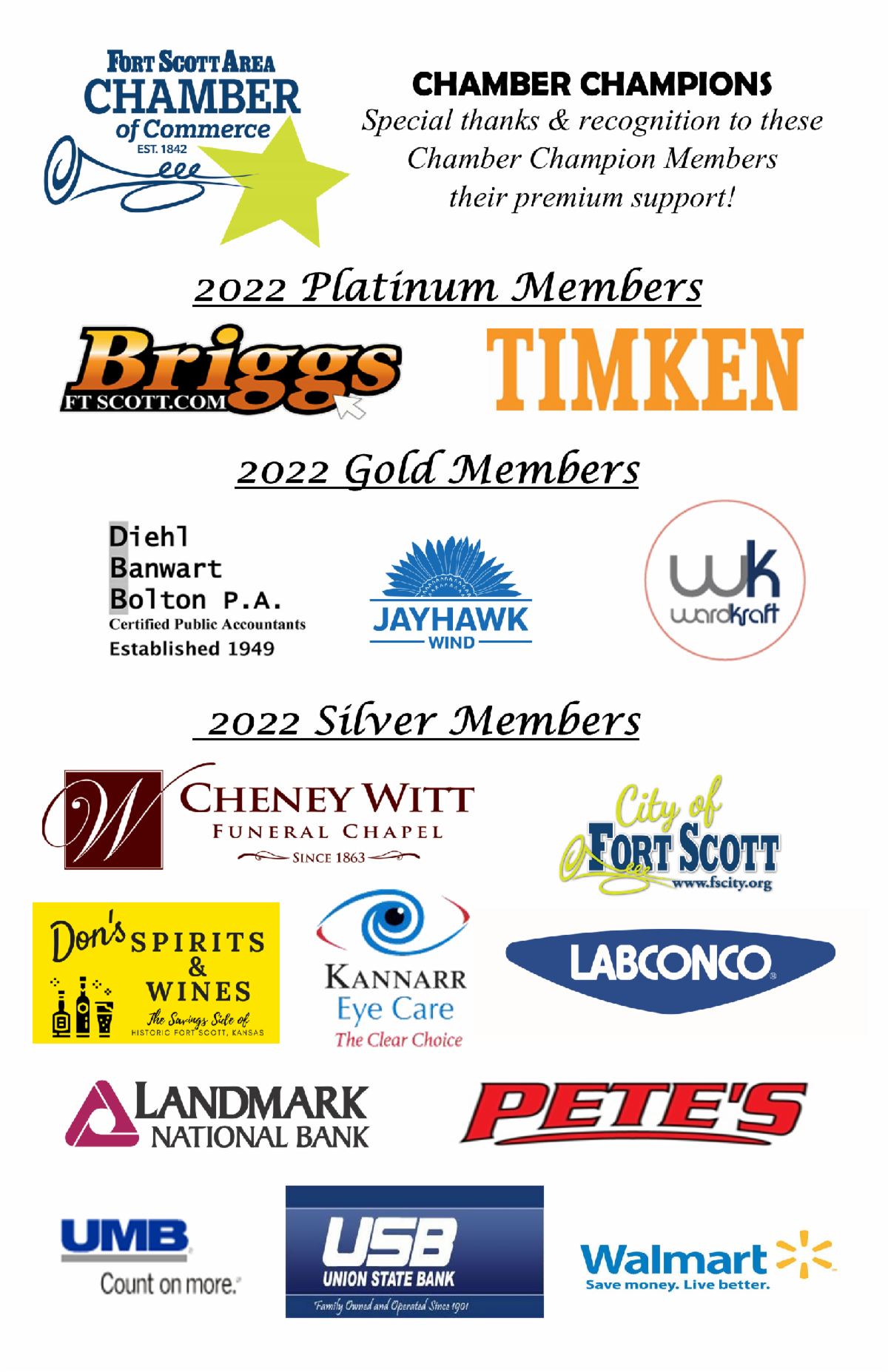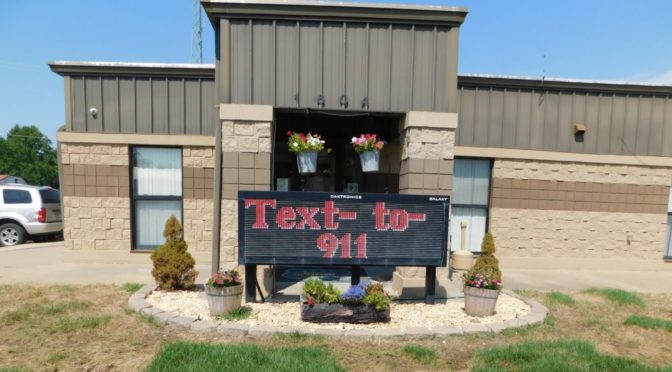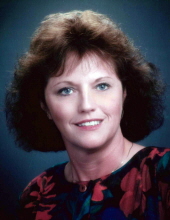All posts by Submitted Story
Draft Minutes of the Uniontown City Council from April 12
The Regular Council Meeting on April 12, 2022 at Uniontown City Hall, was called to order at 7:02 PM by Mayor Jurgensen. Council members present were Jess Ervin, Danea Esslinger, and Josh Hartman. Also in attendance for all or part of the meeting were Susan Eldridge, Uniontown Alumni Association, Raymond “Skeet” George, Uniontown Ruritan, City Superintendent Bobby Rich, City Codes Enforcement Officer Doug Coyan, and City Clerk Sally Johnson.
SPECIAL CONSIDERATIONS/PROJECTS
CITIZENS REQUEST
Susan Eldridge, Uniontown Alumni Association asked for permission to hold the all school reunion in the city park the evening of Saturday, September 3, 2022. They will provide insurance certificate. They request that the ban on alcoholic beverages in the park be lifted for that evening and want to know if there are any other limitations.
Motion by Ervin, Second by Hartman, Approved 3-0 to allow Uniontown Alumni Association to host all school reunion in the city park on September 3, 2022, allow alcohol consumption from 5PM to Midnight, and no glass containers allowed
Raymond “Skeet” George, Ruritan – asked the council to recess to view the location for the proposed public restrooms.
Motion by Ervin, Second by Hartman, Approved 3-0 to recess for 10 minutes to view 112 Second St
Meeting resumed at 7:19. Mr George asked for action to designate the location for the project.
Motion by Hartman, Second by Esslinger, Approved 3-0 to allow preliminary planning for construction of an ADA public restroom at northeast corner of 112 Second St
Discussion followed regarding funding for the public restroom, pickleball court, and outdoor equipment. This project qualifies for the placemaking pathway we pledged. Contact REDI for best time to submit an application for 2022 funding. ARPA funds could also be used for this.
FINANCIAL REPORT
Treasurer Bolinger was absent. March written Treasurer’s Report and 1st Quarter Report were presented. Beginning Checking Account Balance for all funds was $338,643.12, Receipts $52,765.73, Transfers Out $3,026.00, Expenditures $23,883.18, Checking Account Closing Balance $364,499.67. Bank Statement Balance $364,938.99, including Checking Account Interest of $29.90, Outstanding Deposits $0, Outstanding Checks $439.32, Reconciled Balance $364,499.67. Water Utilities Certificates of Deposit $30,063.99, Sewer Utilities Certificate of Deposit $18,566.16, Gas Utilities Certificates of Deposit $28,346.12, Total All Funds, including Certificates of Deposit $441,475.94. Year-to-Date Interest in Checking Acct is $85.61, and Utility CDs $74.84 for a Total Year-to-Date Interest of $160.45. Also included the status of the Projects Checking Account for the month of March 2022, Beginning Balance $0, Receipts $0, Expenditures $0, Ending Balance $0. March Transfers from Sewer Utility Fund to Sewer Revolving Loan $1,402.00; from Water Utility Fund to GO Water Bond & Interest $1,624.00, Total Transfers of $3,026.00. Net Income for the month of March $25,856.55, Year-to-Date Net Income $40,756.17. Budget vs Actual Water Fund YTD Revenue $27,812.18 (26.4%), Expenditures $25,333.54 (19.5%); Sewer Fund YTD Revenue $8,633.12 (24.2%), Expenditures $11,942.48 (29.1%); Gas Fund YTD Revenue $54,144.38 (38.8%), Expenditures $28,296.04 (11.5%); General Fund YTD Revenue $49,170.41 (38.3%), Expenditures $29,562.90 (17.9%); and Special Highway YTD Revenue $1,814.86 (26.5%), Expenditures $397.28 (3.7%). The April 2022 estimated payables in the amount of $29,474.19 were presented.
CONSENT AGENDA
Motion by Ervin, Second by Hartman, Approved 3-0, to approve Consent Agenda:
- Minutes of March 8, 2022 Regular Council Meeting
- Treasurer’s Report, Monthly Transaction Report & Accounts Payables
DEPARTMENT REPORTS
Superintendent Rich reported that the storage building at 112 Second St has been removed, two gas main valves have been replaced, and the speed bumps/signs have been installed.
Codes Enforcement Officer Coyan reported that 104 Fulton has been cleaned up by new owner. An issue of trash in a trailer and debris in the back yard at 202 Fourth St was addressed and trailer has been removed. 103 Fifth is being cleaned up by new owner. He has contacted our attorney twice in the last two months to get something resolved with the Smith Estate with no response back. 301 Second St #1 has a lot of clutter and debris. Clerk Johnson will contact the attorney to try to speed things up. It was suggested to schedule a worksession to continue discussion on shipping/storage containers, accessory/storage buildings, fences regulations and citywide solid waste. It will be scheduled at next meeting. Councilmember Ervin asked him to go by 301 Second St and address the collection of clutter/debris.
Clerk Johnson presented the financial audit contract with minimal increase in cost but less than anticipated in the budget.
Motion by Ervin, Second by Esslinger, Approved 3-0 to accept the financial audit engagement letter with Diehl, Banwart, Bolton
Loren Korte was here with the insurance renewal and went over changes with Clerk Johnson. Overall increase in premiums is 6.74% but less than anticipated in the budget. He will present to council if needed. Council concurred it was not needed.
Rabies clinic was April 9 with a good turnout. Thirteen dogs and seven cats were registered at the clinic. Clerk Johnson presented a list of animals registered last year that are not yet registered this year, a list of new residents that need a reminder that dogs and cats are required to be registered, and a list of those that have registered but not provided proper rabies documentation. She will go over this list with Animal Control Officer Binford to get citations issued.
Kansas Municipal Utilities conference in April 27-29 in Wichita which also includes the KMGA Board of Directors meeting and an afternoon of sessions on gas.
Motion by Ervin, Second by Hartman, Approved 3-0 to allow Bobby Rich and/or Sally Johnson to attend the KMU conference in Wichita, April 27-29, if they choose
KMGA will be hosting regional meetings this year. The one for our area will be in Humboldt on July 14. Will put on the agenda again in June. Clerk Johnson also presented a market update from KMGA.
Midwest Assistance Program would like to assist communities in the application process for USDA community facility project grants and/or loans. Clerk Johnson will contact them for more information about what is available and what would be the city’s obligation.
COUNCIL REPORT
Councilman Ervin – nothing
Councilwoman Esslinger – nothing
Councilman Hartman – nothing
Councilwoman Kelly – absent
Councilman Stewart – absent
Mayor Jurgensen – thanked councilmembers and employees that attended the county commission meeting last month. Asked if fish food has been received. Clerk Johnson has ordered but it has not been shipped yet, she will follow-up. He had a request to change elected officials pay to monthly whether attend regular meeting or not which led to a discussion on protocol for elected officials censure or removal. Clerk Johnson will have the attorney draft an ordinance addressing elected officials pay and protocols.
OLD BUSINESS
Wholesale water supply – table until next month.
Pond Improvement Project – Invitations to bid should be sent/published next month and the liner needs to be ordered due to shipping times.
City Utility Low-Interest Loan update – this does not need to be discussed monthly, put on the agenda quarterly for updates.
American Rescue Plan Act update – The annual report has been submitted. There was some discussion about using the funds for the public restrooms, pickleball court, and outdoor exercise equipment. We will add discussion of the funds to the worksession we schedule next month.
Street Repair – Mayor Jurgensen was thanked for asking county commissioners for a commitment to help us on our streets this year at the March 22 commission meeting. Table further discussion until next month.
NEW BUSINESS
Motion by Ervin, Second by Stewart, Approved 5-0 to enter into executive session pursuant to non-elected personnel matters exception, KSA 4319(b)(1), in order to discuss non-elected personnel, the open meeting to resume at 9:00PM
Meeting resumed at 9:00PM. No action was taken
Moved by Ervin, Second by Esslinger Approved 3-0, to adjourn at 9:00PM
Bourbon County Commission Minutes of April 12
April 12, 2022 Tuesday 9:00 am
The Bourbon County Commission met in open session with all three Commissioners and the
County Clerk present.
Also present for the meeting were, (some were present for a portion of the meeting, some were
present for the entire meeting) Matt Quick, Susan Bancroft, Justin, Meeks, Lora Holdridge, Bill
Martin, Roger Harris, Clint Walker, Anne Dare, Cynthia Stine, Dale Bollinger, Randy Ruby,
Marti Tuchscherer, Patty LaRoche, Nancy Maze, Mark Bolton, Donald Coffman, Tim
Mckenney, Deb Mckenney, Linda Noll, Matt Noll, and Dale Arnold.
Clifton made a motion to approve the previous meeting minutes, Lynne seconded. All approved.
Eric Bailey presented 2 permits: The first permit was Craw-Kan for a utility permit for fiber
installation on Locust Rd and Limestone Rd. Clifton made a motion to approve the permit for
Craw-Kan as stated by Eric Bailey. Lynne seconded. All approved. The second permit was for
Don Garrett/Brad Bradley for a culvert permit for new installation at 35th & Yellowstone Rd.
Clifton made a motion to approve the permit at 35th and Yellowstone as stated by Eric Bailey.
Lynne seconded. All approved.
Eric informed that there is decking loose on a bridge between Birch and Calvary and 120th and
130th. He said it is closed today for repair should be done today and back open. Eric said that
KDOT is in the area and are doing traffic counts in the county in case anyone sees them. He said
that the composting permit for landfill is still in process and has not been approved yet. There is
another review process that needs to be completed before it can be approved. Eric said that
before he gets a bunch of calls on Arrowhead there had been dust control done years ago and
they are tearing it up to fix potholes and turn it back to gravel they, are not paving that road. Eric
informed the commission that there are a few from his department as well as himself that are
going to be attending a training on Thursday in Chanute and has to do with signs as well as other
things. Eric is finalizing the punch list on the windmill project and working with Justin to get the
roads turned back over to county.
Hard surface roads were discussed as to what needed to be completed this year. Jim explained
that there is a sales tax for that purpose and each district get one third of it. Jim said that for his
district he would like to see 195th on the East side of Fort Scott Lake as well as 215th from Indian
to 39 Hwy. Lynne said he would like to see Maple between Uniontown and Bronson, Yale road
and Yellowstone that was tore up and left gravel repaved at Hidden Valley Lake. He also said
that if there was any money left, he would like to see 125th between 54 Hwy and Maple Road.
Eric presented some information on a company called Onyx that is a turnkey operation that
would replace chip and seal and extend the life of the road and hopefully that will help give more
time to resurface the road on a schedule to keep them maintained better. Clifton said that he
would like to see a plan that looked at what roads are the worst and heaviest traveled and have a
plan based on that and not worry about each district getting the exact same amount of money. He
said that all of the road mentioned need fixed and they need a plan to do it even if it isn’t divided
evenly. He said that the roads he would like to look at in his district would be Old 69 Hey
between Fort Scott and Fulton and Soldier Road east of Hammond. He said he didn’t get any money for his district last year because another district needed it more and that is how it should
be done and he would like to see a plan based like that. The commissioners asked Eric to bring a
plan for review but Jim and Lynne both agreed they would like to keep their portion in their own
district unless Clifton needs some since he gave up his last year. The commissioners, Eric Bailey,
and Dustin Hall discussed ways that they could possibly make the money go further and make
the roads last longer with the money that they have available.
Multiple community members were in attendance that expressed concerns for roads in their areas
of the county.
Lynne said he was approached by a patron in Uniontown about tires. I would like permission to
go talk with Ol’ Boy Tires. Clifton made a motion to allow Lynne to go visit with a local
business in Uniontown. Jim seconded. All approved.
Jim asked Eric about putting up the signs previously discussed. Eric said with this being a short
week they would get them up next week.
Lora Holdridge requested an executive session. Clifton made a motion for an executive session
KSA 75-4319(b)(1) to discuss personnel matters of individual nonelected personnel to protect
their privacy including 3 commissioners, Susan Bancroft, Justin Meeks, Lora Holdridge and
Shane Walker for 10 minutes returning at 10:18am to this room. Lynne seconded. All approved.
Clifton made a motion to return to normal session at 10:18am with no action. Lynne seconded.
All approved.
Lynne made a motion to amend agenda moving County Counselor to the end of the session.
Clifton seconded. All approved.
Ashley presented an agreement from Tri-Valley for appropriations of $55,000.00 which is what
was budgeted. This agreement is a renewal from previous year. Clifton made a motion to
approve the agreement. Lynne seconded. All approved.
Susan received notice that we did not receive the base grant which was for the Spyder parking
lot. We’ll have to figure out other ways to do that. That’s the 1st federal grant that you didn’t
receive. She did some checking and no one in Bourbon County or the City received any grant
funding. Susan said she would make some phone calls and find out why. Susan requested an
executive session regarding nonelected personnel for 15 minutes. Clifton made a motion for an
executive session KSA 75-4319(b)(1) to discuss personnel matters of individual nonelected
personnel to protect their privacy including 3 commissioners, Susan Bancroft, Justin Meeks, and
Dave Bruner for 15 minutes returning to this room at 10:37am. Lynne seconded. All approved.
Clifton made a motion to return to normal session at 10:37am with no action. Lynne seconded.
All approved.
Clifton made a motion to allow Mr. Judy for public comment. Lynne seconded. All approved.
Mr. Judy asked if the handicapped ramps could be fixed. Lynne stated that we are in the process
of fixing those.
Clifton made a motion for an executive session KSA 75-4319(b)(1) to discuss personnel matters
of individual nonelected personnel to protect their privacy including 3 commissioners, Justin
Meeks, Susan Bancroft, and Shane Walker for 20 minutes returning to this room at 11:01am.
Lynne seconded. All approved. Clifton made a motion to return to normal session at 11:01am
with no action. Lynne seconded. All approved.
Susan stated that we took quotes for mowing at 401 Woodland Hills Blvd. They were due today
at 10am. Phillips Lawn Care had the lowest per occurrence quote at $500. With the unknowns
of the property we would do at on a month-to-month basis until we figure some things out.
Clifton made a motion to accept the quote from Phillips to mow on a per time as needed basis.
Lynne seconded. All approved. Susan stated that we are looking at possible funding we need
from ARPA funds for EMS. Dave Bruner left some information with me and each commissioner
received a copy. I would like a week to look through and see if it meets all the obligations and
then come back with a proposal on potential ARPA funding. We had a couple hundred thousand
left over from last year’s funds that could possibly help us with some urgent need items for EMS.
They are looking at needing to possibly replace one of the ambulances in the near future, but we
are two years out on a brand new. If we did a remount, it would be 13 months. If we book this
year, we have to pay the entire thing or we could go with a lease purchase which I would
recommend with the unknowns today. Rob Harrington mentioned that there might be a USDA
grant that we are going to look into that and bring information to you next week. Jim asked how
things were coming on the north sidewalk and parking. Susan stated that they looked at it last
week and they are getting ready to give us the engineering report and then we’ll put it out to bid.
Public Comment: Clint Walker talked about an $89 million dollar transmission line project. The
Kansas Corporation Commission has made the decision and no local government has any say in
it whether being a zoned or non-zoned county. Michael Hoyt restated his request that he made a
Uniontown that the commission provide in advance documents that would allow the public to
participate in the budgeting process. There is a public hearing portion of the budget process and
there’s not much we can do if we don’t have the information ahead of time. It is imperative that
this happens.
Susan asked the commissioners to give her authority to go talk to the city manager regarding
EMS.
Elected Official Comment: Who does the grants for the County? Is it internal or outside? Susan
stated it is internal. Bill stated that grants are starting to be available. He would like information
as to why grants are turned down and that information can be passed on to their grant writers for
future.
Commission Comment: Clifton made a motion for Susan to be able to talk to the city manager
concerning EMS. Lynne seconded. All approved. Jim stated that KDOT will be hosting a
region 4 commission road supervisor meeting in Chanute on April 21 at 9am. I am planning to
attend and hope the other two commissioners will consider attending. Eric is planning to attend.
Susan is going as well. Jim made a motion that all commissioners be allowed to attend the
meeting. Clifton seconded. All approved.
Anne dare asked about evening meetings. Garland will be contacted to schedule for April 26th.
May 17th is scheduled at the courthouse at 6pm.
County Counsel Comments: Justin requested an executive session. Clifton made a motion for
an executive session KSA 75-4319(b)(4) to discuss data relating to financial affairs or trade
secrets or corporations, partnerships, trust, and individual proprietorships including 3
commissioners, Susan Bancroft, Rob Harrington, and Justin Meeks for 15
minutes returning to this room at 11:28am. Lynne seconded. All approved. Clifton made a
motion to return to normal session at 11:28am with action. Lynne seconded. All approved.
Clifton made a motion to allow Susan to visit with CEO of Via Christi Hospital concerning
contracts. Lynne seconded. All approved.
Clifton made a motion for an executive session KSA 75-4319(b)(4) to discuss data relating to
financial affairs or trade secrets of corporations, partnerships, trust, and individual
proprietorships including 3 commissioners, Rob Harrington, Susan Bancroft, and Justin Meeks
for 10 minutes returning to this room at 11:41am. Lynne seconded. All approved. Clifton made
a motion to return to normal session at 11:41am with no action. Lynne seconded. All approved.
At 11:42pm, Lynne made a motion to adjourn. Clifton seconded. All approved.
THE BOARD OF COMMISSIONERS
OF BOURBON COUNTY, KANSAS
(ss) Jim Harris, Chairman
(ss) Lynne Oharah, Commissioner
___________________, Commissioner
ATTEST:
Ashley Shelton, Bourbon County Clerk
April 19, 2022, Approved Date
Discovering Fort Scott’s Little Known Stories
Discovering Fort Scott’s Little Known Stories
Exploring the African American Experience
Fort Scott Kan. – Students from Fort Scott High School and Fort Scott Community College will be researching the little known and under told stories of progressive African Americans and leaders from the Fort Scott area.
Students will create audio recordings or videos to share these stories in their ‘voices’ through social media and short films hosted by the National Park Service, Gordon Parks Museum, and their schools.
Exhibits will be developed from their work.
The public is invited to the kickoff for this project on Monday, April 25, at the Ellis Fine Arts Center theater on the Fort Scott Community College campus at 10 a.m.
There will be a presentation by Robin Hickman Winfield, the great niece of Gordon Parks, and Eli Reed, an award-winning photographer, photojournalist, author, and the 2021 Choice of Weapons Award Recipient.
This project will continue through the end of the fall semester with the final media products and presentations.
Death Notice of Ivan “Pokey” Harding Jr.
Ivan LeRoy “Pokey” Harding, Jr., age 77, resident of Ft. Scott, KS, died Monday, April 18, 2022, at his home. Services for Pokey Harding will be announced by the Cheney Witt Chapel, 201 S. Main.
Old Fort Blvd. Closed Friday Afternoon
The City of Fort Scott Street Department will be closing Old Fort Boulevard to Main Street for painting of the parking stalls from 12:00 p.m. on Friday, April 22nd, 2022 until the project is completed later in the day.
Should you have any questions, call City Hall at 620-223-0550.
We appreciate your patience and apologize for any inconvenience during this time.
Chamber Coffee hosted by Bourbon County Conservation District on April 21
The Fort Scott Area Chamber of Commerce invites members and guest to a Chamber Coffee hosted by Bourbon County Conservation District, Thursday, April 21st at 8 a.m., located at 1515 S. Judson St. Attendees will be able to enter a drawing to win prizes. Coffee and light refreshments will be served.
Established in May, 1945, the Bourbon County Conservation District’s mission is to provide leadership and guidance for the use of our natural resources through working with land users, cooperating agencies and the general public by providing educational, technical and financial assistance. District Manager Mandy Shoemaker and the Conservation District Board of Directors are excited to host the Chamber Coffee and welcome everyone to attend.
Chamber members and guests are invited to Chamber Coffee events each Thursday at 8 a.m. to network, make announcements, hear about happenings in the community as well as learn about the host business or organization.
Contact the Chamber of Commerce at (620) 223-3566 for more information.
***
Bacon Me Crazy Food Truck at Presby Village Today until 3 p.m.
|
|
|
|
|
|
|
|
U.S. Senator Jerry Moran Weekly Newsletter
Happy Easter!
Christ the Lord Is Risen
Lives again our glorious King,
Where O death is now thy sting?
Dying once He all doth save,
Where thy victory, O grave?
Love’s redeeming work is done,
Fought the fight, the battle won,
Death in vain forbids Him rise,
Christ has opened paradise.
Soar we now where Christ has led,
Following our exalted Head,
Made like him, like Him we rise,
Ours the cross, the grave, the skies.

Visiting Cottonwood Complex Fire Damage in Reno County
In early March, a massive wildfire, now known as the “Cottonwood Complex fire,” ravaged parts of Reno County. Residents had to evacuate their homes, and 95 homes, 92 outbuildings and 110 vehicles were destroyed in the blaze. One life was tragically lost.
On Monday, I was welcomed by Chief Steven Beer of the Hutchinson Fire Department and Reno County Emergency Manager Adam Weishaar, who introduced me to the men and women who risk their lives to serve and protect their community. This was an opportunity for me to say thank you to these firefighters. They deserve respect and support, especially as we see more dry and windy conditions each year. We must stay vigilant and practice caution when our weather conditions are conducive to producing these destructive wildfires. In December, we saw several major fires spread out over multiple western Kansas counties. And in recent years, we suffered record-breaking wildfires in Barber County in 2016 and Clark County in 2017.
There are mitigation programs that local, state and federal governments can work together on to help reduce this risk that we face too frequently these days. I was able to take away from this meeting a few objectives, including making sure that funds are available to reduce the invasive eastern red cedars which dominate and choke out much of Kansas’ prairie vegetation.
I am grateful to Fire Chief Beer for allowing me to come to Hutchinson and thank the local first responders, but I recognize that there are so many more that have aided in Reno County’s recovery than the few I was able to visit with on Monday. To those communities near and far who sent your firefighters to Reno County to assist and save lives and property last month: thank you. Your kindness and concern for our neighbors makes me proud to represent such great people. Thank you also to Reno County Commissioner Daniel Friesen and Administrator Randy Partington for joining on the visit and to those who provided me an update on the ongoing efforts to keep the Hutchinson community safe. Watch here or below.
Dreams Worth Chasing: Hosting Former Astronaut Dr. Janet Kavandi in Hutchinson
Discussing STEM Education and Inspiring the Next Generation at the Cosmosphere
This week, I hosted former astronaut Dr. Janet Kavandi to speak to area elementary school students at the Cosmosphere and discuss with them the importance of STEM education. Dr. Kavandi shared her upbringing in Carthage, Missouri and how she was selected to be an astronaut in 1994. She was a mission specialist on three Space Shuttle missions and has spent more than a month in space. Dr. Kavandi is current the president of Sierra Space Corporation and shares my goal of inspiring the next generation.

I was pleased that she was able to share her story and take questions from local students, and the Cosmosphere was the perfect place to host an event like this. The Cosmosphere has been a hub for scientific inspiration and educational innovation for the Hutchinson community, for Kansas and for those who come to visit from across the globe since its founding in 1962. From the digital dome theater to the planetarium to the Hall of Space Museum and hands-on lab, the Cosmosphere does an incredible job getting kids and adults alike interested in science and space.
The students were also given a spacecraft tour after they asked Dr. Kavandi questions about being an astronaut. Through my role on the appropriations committee that provides resources to NASA, I have made certain that STEM education is always a priority. Thank you to Dr. Kavandi for speaking to students in Kansas and for helping me inspire future scientists, engineers and astronauts. I also want to thank Jim Remar at the Cosmosphere and their incredible staff for hosting us.

Reception
On Wednesday evening, I also invited Dr. Kavandi to speak at the Cosmosphere regarding her experience as an astronaut and share about her exciting work as president of Sierra Space Corporation. We were joined by community leaders, Cosmosphere Board of Directors, staff and many others interested in space. Thank you again to Dr. Kavandi for joining us and to Jim Remar for hosting the event.

Speaking with Ag Leaders
Prairie Land Electric Coop Annual Meeting
It was great to be in Norton on Tuesday to speak at the Prairie Land Electric Coop annual meeting. We discussed the need for America to produce enough energy to meet our own needs and not be dependent on foreign suppliers like Russia for our energy. We also discussed issues affecting coops like Prairie Land, including access to supplies to repair damaged powerline infrastructure due to extreme weather and the challenges of keeping electricity affordable and reliable for its members and owners. I discussed my Flexible Financing for Rural America Act, legislation which would allow electric cooperatives to reprice Rural Utilities Service (RUS) loans to take advantage of lower interest rates. Taking advantage of lower rates would allow for better cash-flow management, investment in rural communities, and more savings for consumers.
I appreciate the coop for letting me join their meeting and for giving me an update on the issues they are currently facing. Thank you to Ronald Griffith, president of the board, for inviting me to speak.

Prairie Horizon Agri-Energy
I also visited Prairie Horizon Agri-Energy, an ethanol plant outside Phillipsburg, to tour the business and learn more about its contributions to the ethanol industry. Each year, it produces more than 40 million gallons of ethanol which yields 127,000 tons of high protein livestock feed as a byproduct.
While at the plant, it was useful to hear about their plan to construct a new state-of-the-art wheat protein ingredients facility that will create over 60 new jobs. The company plans to retrofit the plant to accommodate wheat-based ethanol production in the future. Once complete, Prairie Horizon will boast the largest wheat protein facility in North America.
Thank you to Plant Manager Kevin Morgan, Chief Operating Officer Steve Adams, Senior Director Kevin Bogenreif and President Justin Kirchhoff for showing me around the plant and discussing the Summit Agricultural Group’s investment plans. This is an exciting time for Prairie Horizon, and I appreciated Kansas State Senator Rick Billinger, Representative Ken Rahjes and local community leader Denis Miller joining us for the tour.

Visiting with High School Students
Buhler
On Monday, I was pleased to spend part of my afternoon with Buhler high schoolers. I greatly appreciated listening to Mr. Bontrager’s freshman choir and speaking with student leaders Jaylee, Kaden and Tanner as they showed me their school.

Chanute
While I was in Chanute on Wednesday, I spoke with students at Chanute High. I enjoyed seeing all aspects of the school, from visiting their greenhouse to stopping into an art class and a biomedical science class. We discussed the importance of career technical education and STEM, and the opportunities for students to start their careers right here in Kansas. Teachers play a vital role in the development of students across our state, and I thank Superintendent Dr. Kellen Adam, Principal Zach Murray and Assistant Principal Tyler Applegate for speaking with me and for the care they put into educating young Kansans. Thank you to student leaders Carson and Emma for showing me their school. Read more about my visit from the Chanute Tribune here.
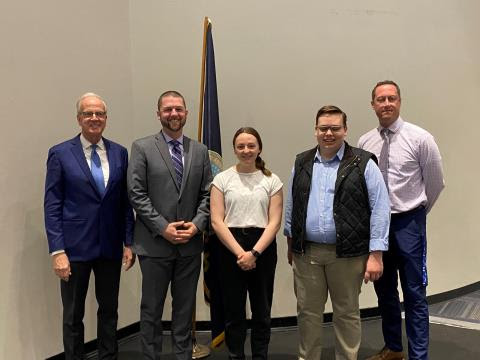
Touring Medical Facilities Across Kansas
Neosho Memorial Regional Medical Center
This week, I was pleased to be at Neosho Memorial Regional Medical Center in Chanute to announce new federal investments in its Imaging Department. Over the past year, I’ve worked closely with Neosho Memorial regarding its need for a new nuclear imaging machine, which is important to providing care for cancer patients, as the existing machine reached the end of its life cycle. It was great to be able to be in Chanute to discuss the importance of both a new SPECT nuclear medicine imaging machine and improvements to the Imaging Department wing to accommodate more patients.
Neosho Memorial provides nuclear medicine and essential cancer detection services to its community, and this new life-saving technology and improvements will allow them to continue to do so for years to come. This is a community-driven solution to the barriers to care so often faced by rural Kansans.
Thank you to Neosho Memorial CEO Dennis Franks and Hospital Foundation Director Anna Methvin for the opportunity to be a part of this grand opening ceremony and for your continued efforts to provide health care services to southeast Kansas.

Rice County District Hospital
I also visited Rice County District Hospital. George Stover, CEO of the hospital, walked me through the facility as we discussed the current condition of rural health care. Kansas officially moved from a pandemic response posture to treating the virus as an endemic disease. However, the CMS vaccine mandate has increased administrative burdens, and rural facilities are still struggling with financial stress as a result of the pandemic. I will continue relaying these concerns to the Department of Health and Human Services and working to ensure Kansas hospitals have the support needed to serve their communities. Thank you to Judy Hodgson, George Stover and Terry Pound for their time visiting with me.

Commemorating Brown v. Board of Education Sites
The Senate recently and unanimously passed legislation to commemorate the historic sites that contributed to the 1954 landmark Supreme Court decision, Brown v. Board of Education of Topeka. This legislation will expand the Brown v. Board of Education National Historic Site to include historic sites in South Carolina and designate National Park Service (NPS) Affiliated Areas in other states. It would recognize the importance of the additional sites that catalyzed litigation in Delaware, South Carolina, Kansas, Virginia and the District of Columbia by designating them NPS Affiliated Areas, and expand the Brown v. Board of Education National Historic Site in Topeka.
Kansan Linda Brown and her parents took their case all the way to the Supreme Court in Brown v. Board of Education, leading to the unanimous overturn of the ‘separate but equal’ doctrine that discriminated against school children because of their skin color. I look forward to the President signing this legislation into law to expand and preserve the historic sites in Kansas and around the country connected to this case. Kansas has played a key role in the civil rights movement, and we must seek to preserve this legacy which calls on all Americans to uphold the self-evident truth that all men and women are created equal. The bill text is available here.
The National Trust for Historic Preservation is a privately funded nonprofit organization that works to save America’s historic places.
The African American Cultural Heritage Action Fund is a multi-year initiative led by the National Trust for Historic Preservation in partnership with the Ford Foundation, the JPB Foundation, the Open Society Foundations and other partners, working to make an important and lasting contribution to our cultural landscape by elevating the stories and places of African American achievement and activism.
Honoring Veterans Who Helped with Evacuations from Afghanistan
As ranking member of the Senate Veterans’ Affairs Committee, I introduced a resolution honoring the veterans of the U.S. Armed Forces and civilian volunteers who organized evacuations during our withdrawal from Afghanistan in August 2021.
Our military personnel worked tirelessly to coordinate flights in and out of Kabul, but another force behind these efforts lies with groups of veteran volunteers who refused to leave their Afghan partners behind. These volunteer veteran groups shared information, drafted flight manifests and coordinated food and supplies to be delivered to families who were in hiding. Without these volunteers, many Afghan men, women and children would have suffered greatly or lost their life. This week, we offered this resolution to officially recognize and thank the veteran volunteers for their efforts to save their Afghan partners from the clutches of the Taliban. The resolution can be found here.
Demanding Answers on Changes to Border Security Policies
This week, I led 12 of my colleagues in seeking answers from Department of Homeland Security Secretary Alejandro Mayorkas on recent changes to how the department enforces border security and processes migrants at the southern border. In FY2021, U.S. Customs and Border Protection (CBP) recorded 1.7 million encounters with individuals attempting to cross the border illegally, the highest single year total ever recorded. Even more troubling is the fact that this year is on pace to far exceed the record-breaking numbers from last year.
This administration’s continued push to weaken our immigration enforcement, through moves like rescinding the Title 42 public health order, de-prioritization of those eligible for arrest and removal and drastically altering how America grants asylum, is reckless and dangerous. Currently, tens of thousands of migrants are gathering at our Southern border and the policies of the Biden administration are only fueling the impending surge, presenting a serious threat to public safety and will lead to an even greater humanitarian crisis. Read my full letter here.
Graham County Listening Tour Stop
I held a listening tour stop in Hill City this week, where I had the opportunity to speak to and hear from Graham County residents. We discussed the importance of supporting our law enforcement community, Putin’s evil in Ukraine and the United States’ humanitarian efforts to help Ukrainian citizens. I heard concerns regarding border security and the administration’s decision to terminate the Title 42 Order, as well as concerns surrounding local nursing home operations. I was also able to announce federal investments in Graham County Sheriff’s Office to update its mobile communications technology and help as they carry out their duties.
Thank you to Jim Logback for his years of support, to those who took time to share their concerns with me and to Cole Presley, Graham County Sheriff and President of the Kansas Sheriff’s Association for being in attendance.
Visit to Kansas City VA Medical Center
On Friday, I visited Kansas City VA Medical Center where I spoke with KCVA Director Jean Gurga and Assistant Director Ryan Locascio. KCVA plays a vital role in the health care of veterans living in and around eastern Kansas and western Missouri, providing service to over 50,000 veterans each year. I expressed my commitment to working on and passing legislation for toxic-exposed veterans. When our men and women are injured or become ill because of their military service, it is our responsibility to see they receive the health care and benefits they deserve. It is the right thing to do and the cost of going to war.
The facility offers a full range of services with state-of-the-art technology as well as education and research. We discussed the research projects KCVA is conducting, the importance of their community-based outpatient clinics and my veterans’ mental health care legislation.
As ranking member of the Senate VA Committee, I am committed to bolstering the quality of care provided to those who have served and sacrificed.

Visiting Prairie View
From City Hall to the businesses along Main Street, thank you to everyone who took time out of their day to speak with me when I stopped into Prairie View this week.
Passover
Happy Passover to the families and friends who gathered for Seders in Kansas and around the world on Friday evening. Chag Pesach Sameach!

![]()
The Fort Scott Police Department Daily Reports April 18
The Bourbon County Sheriff’s Office Daily Reports April 19
Obituary of Karen Stewart
Karen A. Stewart, age 73, resident of Ft. Scott, KS, died Sunday, April 17, 2022, at her home. She was born February 19, 1949, in Ft. Scott, the daughter of Harold “Dutch” Hurd and Betty Jean Severy Hurd. She married Donald L. Stewart on August 27, 1965, in Ft. Scott. He preceded her in death on February 19, 2011. Karen owned and operated the Satisfactory Beauty Salon in downtown Ft. Scott for several years. She and Don together owned Stewart Realty Company for many years as well. She enjoyed yard work, planting trees, and mowing the lawn. She was a very good cook and baker. Karen also was accomplished in decorating.
Survivors include two sons, Donald L. “JR” Stewart and wife Wendy, and Brent M. Stewart all of Ft. Scott; two brothers, Rick Hurd and wife Shirley, and Ron Hurd and wife Etta, all of Ft. Scott; two grandchildren, Jordan Stewart, and Paige Stewart-Goodbody; four great grandchildren, Keagan Stewart, Bryson Davidson, Daeson Davidson, and Greyson Stewart; and numerous nieces and nephews.
Besides her husband, she was preceded in death by a granddaughter, Brenna Bollinger, and her parents.
Pastor Floyd Minor will conduct funeral services at 10:30 AM Friday, April 22nd at the Cheney Witt Chapel.
Burial will follow in the Centerville Cemetery.
The family will receive friends from 5:00 until 6:00 PM Thursday at the Cheney Witt Chapel.
Memorials are suggested to Care to Share and may be left in care of the Cheney Witt Chapel, PO Box 347, 201 S. Main St., Ft. Scott, KS 66701. Words of remembrance may be submitted to the online guestbook at cheneywitt.com.
